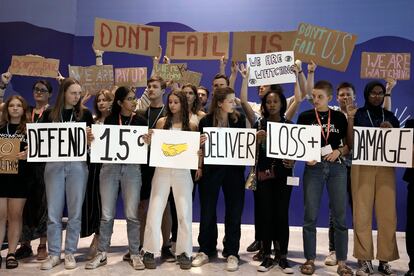COP27 agrees to ‘loss and damage’ fund for poor countries vulnerable to climate change
The summit, however, failed to reach an agreement to phase out fossil fuels or set more ambitious targets to limit global warming to 1.5ºC


In the midst of a global energy crisis and the war in Ukraine, the representatives of the almost 200 nations at the COP27 climate summit in Sharm El-Sheikh reached an agreement that could be decisive for the future of countries most vulnerable to climate change. After more than two weeks of tense negotiations, the delegates agreed to set up a “loss and damage” fund to help poor countries stricken by climate disaster. The climate summit, however, did not reach a deal to progressively phase out the fossil fuels responsible for climate change – the main demand of environmentalists and some countries.
Billed as the “African COP,” the summit in Egypt had promised to highlight the plight of poor countries facing the most severe consequences of global warming caused mainly by wealthy, industrialized nations. “Loss and damage” is an expression that covers the irreversible damage caused by climate change, which is set to intensify in the future. For example, islands disappearing due to rising sea levels, and the impact of more extreme weather events, such as the severe floods in Pakistan, which flooded 10% of the country and caused $30 billion in losses.
Since the first climate summit in 1995, debate on loss and damage has largely been avoided. But with extreme weather events on the rise – and accelerating at a faster rate than what was predicted – vulnerable nations, which are the least responsible for the climate crisis, were able to put the issue at the center of the COP27 agenda. It initially appeared unlikely that the summit would reach an agreement on a fund to support poor nations, but negotiations succeeded in pushing through the deal.
The agreement, however, does not specify who will pay for the fund, nor which countries fall into the “vulnerable” category. Developed nations do not want to be solely responsible for financing the plan, and have asked other high emitters, such as China, to contribute. The final text of the deal is open – it mentions the World Bank, the International Monetary Fund (IMF) and the need to search for other forms of financing – but does not specifically name developing nations, or any other bloc. These details are set to be decided upon in the coming months. The idea is that the fund will be up and running from 2023.
“The agreements made at COP27 are a win for our entire world,” Molwyn Joseph, chair of the Alliance of Small Island States, said in a statement. “We have shown those who have felt neglected that we hear you, we see you, and we are giving you the respect and care you deserve.”
While the fund is considered a win, this victory was tempered by the fact that the summit reached no agreement on phasing out fossil fuels. The European Union wanted nations to commit to more ambitious emissions cuts, a demand set with China in mind, which is currently the world’s leading emitter, contributing almost 30% of the global emissions. Debate on the issue delayed the closing of the summit, which was scheduled to end on Friday, but was extended until Sunday morning. The extra time, however, failed to secure more ambitious targets for emissions cuts.
There is concern that if the current targets are not changed, there is no possibility of keeping global warming below 1.5ºC. Under the Paris Agreement, nations agreed to emission cuts that would keep global warming below 2.5ºC in the best-case scenario. With the planet already 1.1ºC about pre-industrial levels, there have been growing calls for more ambitious targets.
The final text of the Sharm el-Sheikh summit does not weaken the current targets, but nor is it the step forward that many nations had called for. Decisions at the summits are made unanimously, meaning that only one of the almost 200 countries participating in the talks can block an issue. As a result, oil and gas-producing countries such as Russia were able to hamper deals for stronger cuts.
According to scientists, to keep global warming to 1.5ºC, global greenhouse gas emissions must fall dramatically. By 2030, they should be 45% lower than 2010 levels. But under the current plans, emissions are only set to fall between 5% and 10%. Both the US and the EU argue that they are aiming to reduce emissions by 45%.
Tu suscripción se está usando en otro dispositivo
¿Quieres añadir otro usuario a tu suscripción?
Si continúas leyendo en este dispositivo, no se podrá leer en el otro.
FlechaTu suscripción se está usando en otro dispositivo y solo puedes acceder a EL PAÍS desde un dispositivo a la vez.
Si quieres compartir tu cuenta, cambia tu suscripción a la modalidad Premium, así podrás añadir otro usuario. Cada uno accederá con su propia cuenta de email, lo que os permitirá personalizar vuestra experiencia en EL PAÍS.
¿Tienes una suscripción de empresa? Accede aquí para contratar más cuentas.
En el caso de no saber quién está usando tu cuenta, te recomendamos cambiar tu contraseña aquí.
Si decides continuar compartiendo tu cuenta, este mensaje se mostrará en tu dispositivo y en el de la otra persona que está usando tu cuenta de forma indefinida, afectando a tu experiencia de lectura. Puedes consultar aquí los términos y condiciones de la suscripción digital.








































